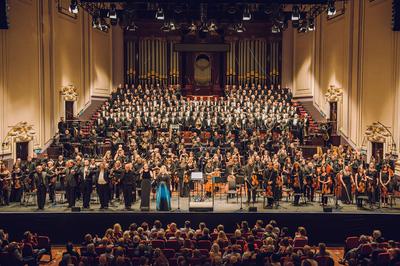
News Story
At the turn of the 20th Century, audiences across Europe witnessed the last breath of Romanticism and the introduction of a radically different, atonal style.
In August we will hear the musical language of the late 19th Century expand to bursting point as it crosses over into a new century.

Fittingly, Arnold Schoenberg’s Gurrelieder will conclude the Usher Hall programme. It is a spectacular work – they don’t get much more epic than this.
Gurrelieder’s crafting owes a lot to Schoenberg’s relationship with Gustav Mahler. The two composers were key figures in Vienna at the turn of the century – a city thriving with innovation and scandal.
Schoenberg would later go on to change the course of musical history, ushering in an onslaught of dissonance. Mahler was a huge supporter of Schoenberg’s work before his untimely death in 1910, and his late works cast a shadow across this year’s classical programme.
Gurrelieder represents the death-rattle of an old style; the final sections of the work appear to falter and fall off the tracks of tonality in a crushingly grand final statement. It won’t die without a fight.
In other concerts…
Russian composers like Scriabin and Rachmaninov are toying with the fringes of tonality, creating lush landscapes that will go on to underscore Hollywood dramas.
Stepping over to Finland, Sibelius is busy putting his country on the map. His violin concerto dispenses with the traditional ‘solo instrument – orchestral accompaniment’ idiom in favour of a more democratic approach. The results are stunning.
In The Queen’s Hall, visit Belle Epoque Paris with Patricia Petibon and the roaring cabarets of New York with Simon Keenlyside, in swinging music that shuns the grandeur of the opera houses for the populist Salons of Paris and New York’s fledgling Broadway.
There is more raucousness to be had on the other side of the First World War in Barry Humphries’ Weimar Cabaret. Unapologetic and defiant, this concert explores the hedonistic yet fragile music of Berlin the 1920s – “music Hitler hated.”
At this year’s International Festival, come with us on a journey through a Europe teetering on the brink. Listen to its music creak and fold under the weight of huge social and political shifts, as it crosses borders; both geographically and stylistically.
Photo Credit:
Gurreleider Curtain Call © Mihaela Bodlovic
Barry Humphries & Meow Meow © Claudio Raschella